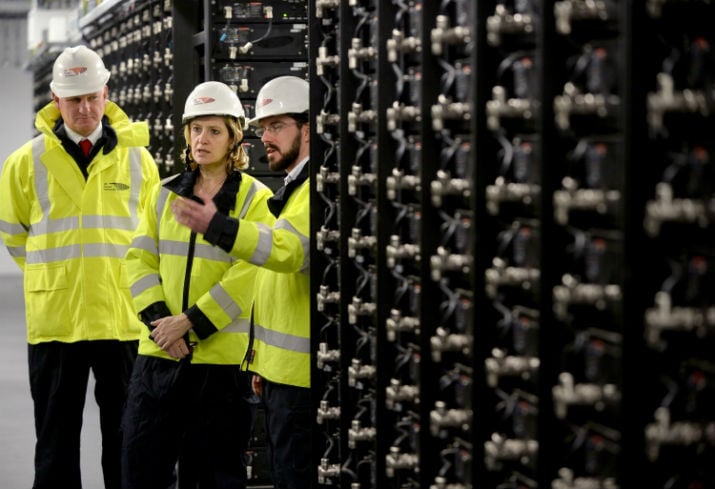Zinc-Ion Batteries Cut Costs for Grid Energy Storage
Nicolette Emmino
29 August 2016
Researchers from the University of Waterloo have developed a long-lasting zinc-ion battery that’s 50 percent cheaper than current lithium-ion batteries and could help communities shift away from traditional power plants and into renewable solar and wind energy production.
Energy companies work alongside UK Power Networks on the UK's battery storage demonstration project seen here. (Image Credit: UKPN)
The battery, which uses safe, non-flammable, non-toxic materials and a pH-neutral, water-based salt, consists of a water-based electrolyte, a pillared vanadium oxide positive electrode and an inexpensive metallic zinc negative electrode. It generates electricity via a reversible process called intercalation, in which positively-charged zinc ions are oxidized from the zinc metal negative electrode, travel through the electrolyte and wedge between the layers of vanadium oxide nanosheets in the positive electrode. This process propels the flow of electrons in the external circuit in order to create an electrical current. The reverse process occurs on charge.
In demonstrations, the battery provided more than 1,000 cycles with 80% capacity retention and an estimated energy density of 450 watt-hours per liter. While lithium-ion batteries also operate by this intercalation process, they use expensive and flammable organic electrolytes.
“The worldwide demand for sustainable energy has triggered a search for a reliable, low-cost way to store it,” said Professor Linda Nazar from the Faculty of Science at Waterloo, who made the important discovery.
“The aqueous zinc-ion battery we’ve developed is ideal for this type of application because it’s relatively inexpensive and it’s inherently safe.”
With the global market for energy storage expected to grow to $25 billion in the next 10 years, a zinc battery would benefit manufactures since they can be fabricated at low costs and without the need for special conditions like ultra-low humidity or handling of flammable materials that are needed for lithium ion batteries.
“The focus used to be on minimizing size and weight for the portable electronics market and cars,” said Dipan Kundu, a postdoctoral fellow in Nazar’s lab and the paper’s first author. “Grid storage needs a different kind of battery and that’s given us license to look into different materials.”
Nazar and the team are also working with researchers at the Joint Center for Energy Storage Research in the U.S. to investigate multivalent ion intercalation batteries based on Mg2+ in non-aqueous electrolytes.
http://electronics360.globalspec.co...n-batteries-cut-costs-for-grid-energy-storage
- Forums
- ASX - By Stock
- MCT
- Good news for Mct?
Good news for Mct?, page-22
Featured News
Add MCT (ASX) to my watchlist
 (20min delay) (20min delay)
|
|||||
|
Last
0.2¢ |
Change
0.000(0.00%) |
Mkt cap ! $8.971M | |||
| Open | High | Low | Value | Volume |
| 0.2¢ | 0.2¢ | 0.2¢ | $500 | 250K |
Buyers (Bids)
| No. | Vol. | Price($) |
|---|---|---|
| 57 | 180380980 | 0.1¢ |
Sellers (Offers)
| Price($) | Vol. | No. |
|---|---|---|
| 0.2¢ | 50000 | 1 |
View Market Depth
| No. | Vol. | Price($) |
|---|---|---|
| 56 | 175380980 | 0.001 |
| 0 | 0 | 0.000 |
| 0 | 0 | 0.000 |
| 0 | 0 | 0.000 |
| 0 | 0 | 0.000 |
| Price($) | Vol. | No. |
|---|---|---|
| 0.002 | 50000 | 1 |
| 0.003 | 93863611 | 60 |
| 0.004 | 16390286 | 10 |
| 0.005 | 11673264 | 11 |
| 0.006 | 18220175 | 13 |
| Last trade - 15.58pm 12/07/2024 (20 minute delay) ? |
Featured News
| MCT (ASX) Chart |










